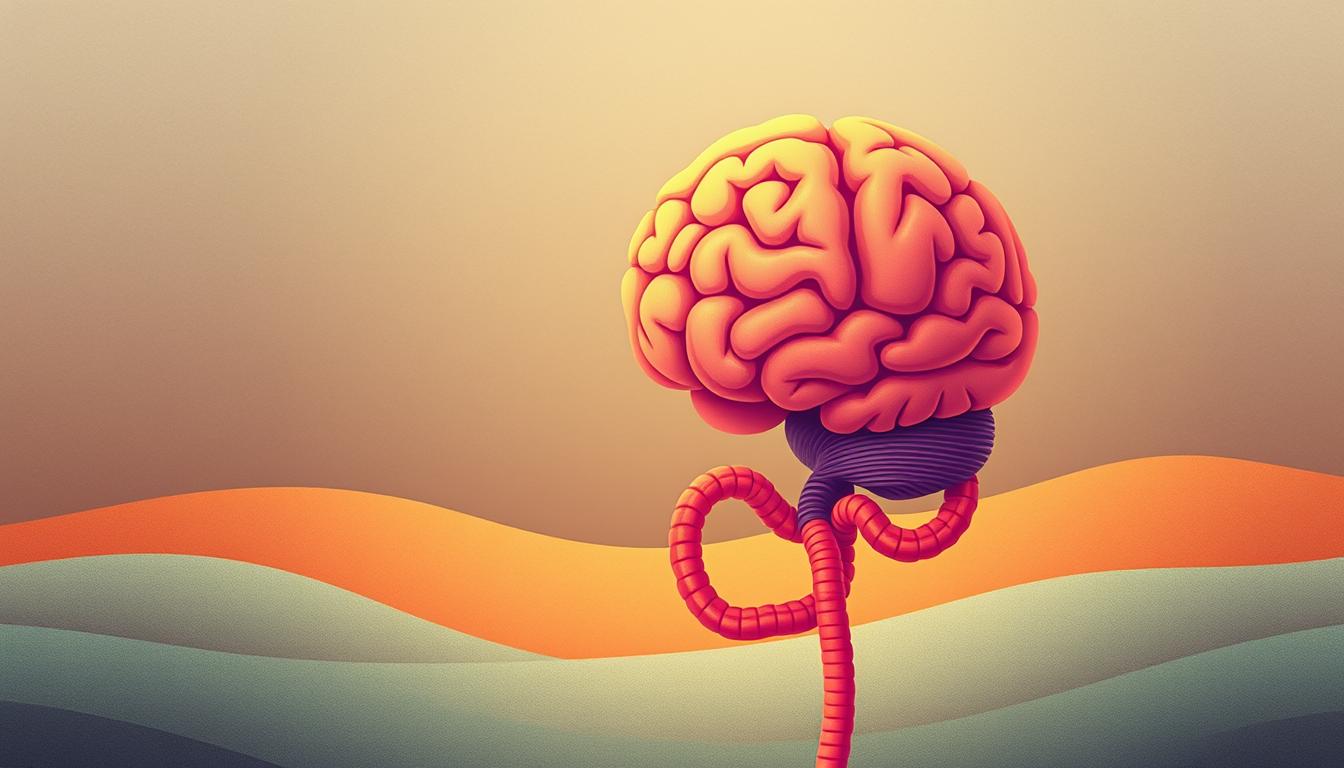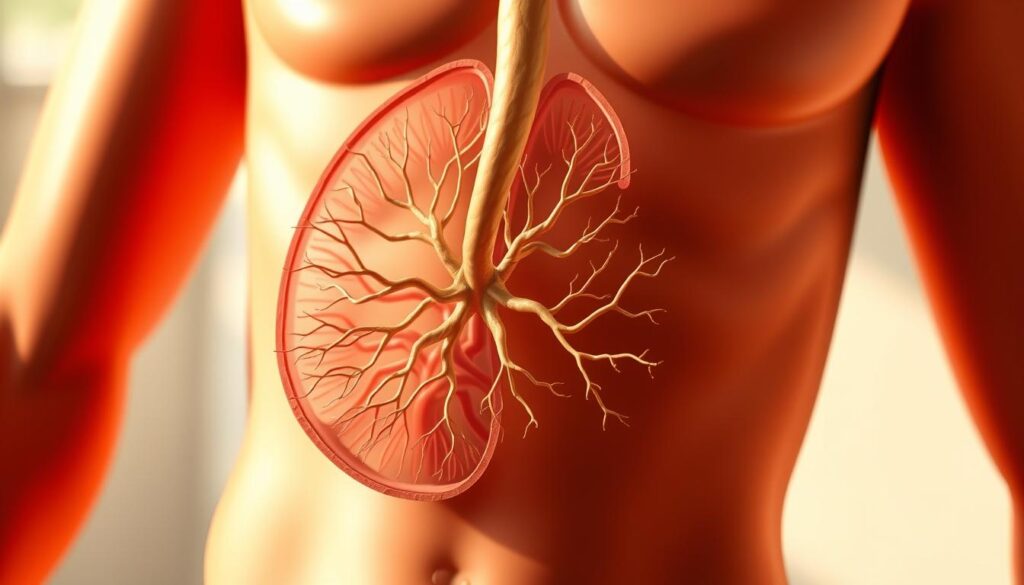Have you ever felt a gut-wrenching anxiety or a gut feeling that turned out to be right? The connection between our gut and brain is more than just a figure of speech. Research has shown that the gut and brain are intricately linked, influencing each other in complex ways.
This gut-brain connection plays a crucial role in our overall mental wellness. By understanding and nurturing this connection, we can take a holistic approach to improving our mental health.
In this article, we will explore the significance of the gut-brain connection and how it impacts our holistic wellness. We’ll delve into the latest research and provide insights on how to boost your mental wellness by leveraging this powerful connection.
Key Takeaways
Table of Contents
- The gut and brain are connected through complex pathways.
- This connection affects our mental health and wellness.
- Nurturing the gut-brain connection can improve mental wellness.
- A holistic approach is essential for overall wellness.
- Understanding the gut-brain connection can lead to better mental health strategies.
Understanding the Gut-Brain Connection
Delving into the gut-brain connection reveals a fascinating network that impacts our mental health and digestive system. This complex interaction is facilitated by the enteric nervous system and influenced by the gut microbiome.
What Is the Enteric Nervous System?
The enteric nervous system (ENS) is often referred to as the “second brain” because it operates independently of the central nervous system, controlling the gastrointestinal tract’s function. The ENS produces many neurotransmitters found in the brain, such as serotonin and dopamine, which play crucial roles in mood regulation and other cognitive functions.
How Your Gut Communicates with Your Brain
Communication between the gut and the brain occurs through the vagus nerve and the release of neurotransmitters. The gut microbiome influences this communication by producing metabolites that can either support or hinder the production of neurotransmitters. This bidirectional communication network is essential for maintaining not only digestive health but also mental wellbeing.
| Key Components | Functions |
|---|---|
| Enteric Nervous System (ENS) | Controls gastrointestinal tract function, produces neurotransmitters |
| Gut Microbiome | Influences neurotransmitter production, communicates with the brain |
| Vagus Nerve | Primary pathway for gut-brain communication |
The Science Behind Gut-Brain Connection and Mental Wellness
Understanding the science behind the gut-brain connection can revolutionize our approach to mental health. The gut and the brain are connected through a complex network that influences our overall well-being. This connection is bidirectional, meaning that the health of one can significantly impact the other.
The Role of the Vagus Nerve
The vagus nerve is a key player in the gut-brain axis, serving as a primary communication pathway between the gut and the brain. It enables the exchange of information between the enteric nervous system and the central nervous system, influencing various physiological processes, including mood regulation and stress response. Stimulation of the vagus nerve has been shown to have a positive impact on mental health.
Gut Microbiome and Neurotransmitter Production
The gut microbiome plays a crucial role in producing neurotransmitters that are vital for mental health. The gut is home to trillions of microorganisms that influence the production of various neurotransmitters.
Serotonin Production in the Gut
A significant portion of the body’s serotonin, a neurotransmitter that regulates mood, is produced in the gut. An imbalance in the gut microbiome can affect serotonin levels, potentially leading to mood disorders.
GABA and Other Mood Regulators
The gut microbiome also influences the production of GABA (gamma-aminobutyric acid) and other neurotransmitters that regulate mood and cognitive function. An imbalance can lead to anxiety, depression, and other mental health issues.
Inflammation’s Impact on Mental Health
Inflammation in the gut can have a profound impact on mental health. Chronic inflammation can lead to changes in the brain that contribute to the development of mental health disorders. Maintaining a healthy gut microbiome is crucial for reducing inflammation and supporting mental wellness.
How to Improve Your Gut-Brain Connection and Mental Wellness
By making informed dietary choices, you can strengthen your gut-brain connection and improve your mental wellness. A well-balanced diet rich in essential nutrients can significantly enhance your gut health, which in turn supports your mental health.
Incorporate Probiotic-Rich Foods
Probiotics are live bacteria and yeasts that are beneficial for your gut health. They can be found in fermented foods like yogurt, kefir, and sauerkraut. Incorporating these foods into your diet can help maintain a healthy gut microbiome.
Fermented Foods to Try Daily
Some fermented foods you can try daily include kimchi, kombucha, and miso. These foods are not only rich in probiotics but also add variety to your meals.
Probiotic Supplements: When and How
If you’re unable to get enough probiotics from food sources, consider taking probiotic supplements. However, it’s essential to consult with a healthcare professional to determine the best probiotic strain and dosage for your needs.
Add Prebiotic Fiber to Your Diet
Prebiotic fiber serves as food for beneficial bacteria in your gut, helping them thrive. Foods rich in prebiotic fiber include asparagus, bananas, and onions. Adding these to your diet can support a healthy gut microbiome.
Reduce Inflammatory Foods
Some foods can trigger inflammation in your body, negatively impacting your gut health. Reducing or avoiding sugary drinks, refined carbohydrates, and processed meats can help minimize inflammation.
Stay Hydrated for Optimal Gut Function
Adequate hydration is crucial for maintaining a healthy gut. Water helps dissolve nutrients and soluble fiber, making them more accessible to your gut bacteria.
Include Omega-3 Fatty Acids
Omega-3 fatty acids, particularly EPA and DHA, have anti-inflammatory properties that can support both gut and brain health. You can find omega-3s in fatty fish like salmon, sardines, and mackerel.
Lifestyle Practices to Support Your Gut-Brain Axis
Your gut and brain are intricately linked, and certain habits can support this delicate balance. By incorporating specific lifestyle practices into your daily routine, you can enhance your gut-brain connection and promote overall mental wellness.
Effective Stress Management Techniques
Stress can significantly impact both your gut and brain health. Implementing effective stress management techniques is crucial for maintaining a healthy gut-brain axis.
Mindfulness and Meditation
Mindfulness and meditation are powerful tools for reducing stress. Regular practice can help calm your mind, reduce inflammation, and promote a healthy gut microbiome. Start with short sessions and gradually increase the duration.
Breathing Exercises for Vagal Tone
Breathing exercises can improve your vagal tone, which is essential for the communication between your gut and brain. Deep, diaphragmatic breathing can help reduce stress and promote relaxation.
Exercise Routines That Benefit Both Gut and Brain
Regular exercise is beneficial for both gut and brain health. It can improve gut motility, reduce inflammation, and boost mood. Aim for at least 30 minutes of moderate-intensity exercise most days of the week.
- Aerobic exercises like walking, cycling, or swimming
- Strength training to build muscle and improve overall health
- Yoga or Pilates for flexibility and stress reduction
Creating a Sleep Routine for Gut Health
A consistent sleep routine is vital for gut health. Poor sleep can disrupt the gut microbiome and impair gut-brain communication. Establish a regular sleep schedule and create a bedtime routine to signal your body that it’s time to sleep.
| Sleep Routine Tips | Benefits |
|---|---|
| Maintain a consistent sleep schedule | Regulates gut microbiome |
| Create a bedtime routine | Improves sleep quality |
| Avoid screens before bedtime | Enhances melatonin production |

Recognizing and Addressing Gut-Brain Imbalance
Recognizing the indicators of gut-brain imbalance is the first step towards achieving holistic health. The connection between the gut and the brain is complex, and an imbalance can manifest in various ways.
Physical Symptoms to Watch For
Physical symptoms of gut-brain imbalance can include:
- Digestive issues such as bloating, constipation, or diarrhea
- Fatigue and lethargy
- Skin problems like acne or eczema
These symptoms can be early warning signs that the gut and brain are not communicating effectively.
Mental and Emotional Indicators
Mental and emotional indicators can be just as telling, with symptoms such as:
- Anxiety and depression
- Mood swings and irritability
- Difficulty concentrating and memory issues
These signs suggest that the gut-brain axis is out of balance, affecting psychological health.
Conclusion: Your Path to Holistic Mental Wellness Through Gut Health
By understanding the intricate relationship between your gut and brain, you can take the first step towards achieving holistic mental wellness. Prioritizing gut health is essential for maintaining emotional well-being and overall mental health.
Nourishing your gut with probiotic-rich foods, prebiotic fiber, and omega-3 fatty acids can significantly impact your mental wellness. Additionally, adopting lifestyle practices such as effective stress management, regular exercise, and a consistent sleep routine can further support your gut-brain axis.
Recognizing the signs of gut-brain imbalance and taking proactive steps to address them can lead to improved emotional well-being and a healthier gut. By making informed choices about your diet and lifestyle, you can embark on a path towards achieving holistic mental wellness through gut health.
FAQ
What is the gut-brain connection, and how does it impact mental wellness?
The gut-brain connection refers to the complex communication network between the gut microbiome and the brain. This connection plays a crucial role in mental wellness, as the gut produces neurotransmitters and hormones that influence mood, cognitive function, and emotional well-being.
How can I improve my gut health to support mental wellness?
To improve gut health, incorporate probiotic-rich foods, prebiotic fiber, and omega-3 fatty acids into your diet. Additionally, reducing inflammatory foods, staying hydrated, and managing stress through techniques like mindfulness and meditation can support a healthy gut-brain axis.
What are some common signs of gut-brain imbalance?
Common signs of gut-brain imbalance include digestive issues, fatigue, anxiety, depression, and mood swings. Physical symptoms like bloating, abdominal pain, and changes in bowel habits can also indicate an imbalance.
Can lifestyle practices like exercise and sleep impact the gut-brain connection?
Yes, regular exercise and a consistent sleep routine can positively impact the gut-brain connection. Exercise can improve gut motility and reduce inflammation, while adequate sleep helps regulate the gut microbiome and support mental health.
Are there any specific foods that can harm the gut-brain connection?
Foods high in sugar, processed foods, and those containing artificial additives can disrupt the balance of the gut microbiome and negatively impact mental wellness. Reducing or avoiding these foods can help support a healthy gut-brain axis.
How do probiotics and prebiotics support mental health?
Probiotics introduce beneficial bacteria into the gut, promoting a balanced gut microbiome. Prebiotics provide fiber that feeds these beneficial bacteria, supporting their growth and activity. Together, they can enhance neurotransmitter production, reduce inflammation, and support mental well-being.
Can stress management techniques like meditation and deep breathing improve gut health?
Yes, stress management techniques like meditation, deep breathing, and mindfulness can help reduce stress and promote a healthy gut-brain axis. These practices can improve vagal tone, reduce inflammation, and support the balance of the gut microbiome.

